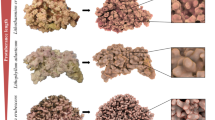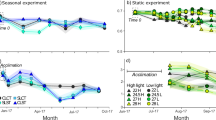Abstract
Ocean acidification is changing the marine environment, with potentially serious consequences for many organisms. Much of our understanding of ocean acidification effects comes from laboratory experiments, which demonstrate physiological responses over relatively short timescales1,2,3,4,5,6,7,8,9,10. Observational studies and, more recently, experimental studies in natural systems suggest that ocean acidification will alter the structure of seaweed communities11,12,13. Here, we provide a mechanistic understanding of altered competitive dynamics among a group of seaweeds, the crustose coralline algae (CCA). We compare CCA from historical experiments (1981–1997) with specimens from recent, identical experiments (2012) to describe morphological changes over this time period, which coincides with acidification of seawater in the Northeastern Pacific14,15,16. Traditionally thick species decreased in thickness by a factor of 2.0–2.3, but did not experience a change in internal skeletal metrics. In contrast, traditionally thin species remained approximately the same thickness but reduced their total carbonate tissue by making thinner inter-filament cell walls. These changes represent alternative mechanisms for the reduction of calcium carbonate production in CCA and suggest energetic trade-offs related to the cost of building and maintaining a calcium carbonate skeleton as pH declines. Our classification of stress response by morphological type may be generalizable to CCA at other sites, as well as to other calcifying organisms with species-specific differences in morphological types.
This is a preview of subscription content, access via your institution
Access options
Subscribe to this journal
Receive 12 print issues and online access
$209.00 per year
only $17.42 per issue
Buy this article
- Purchase on Springer Link
- Instant access to full article PDF
Prices may be subject to local taxes which are calculated during checkout



Similar content being viewed by others
References
Ries, J. B., Cohen, A. L. & McCorkle, D. C. Marine calcifiers exhibit mixed responses to CO2-induced ocean acidification. Geology 37, 1131–1134 (2009).
Martin, S. & Gattuso, J-P. Response of Mediterranean coralline algae to ocean acidification and elevated temperature. Glob. Change Biol. 15, 2089–2100 (2009).
Ragazzola, F. et al. Ocean acidification weakens the structural integrity of coralline algae. Glob. Change Biol. 18, 2804–2812 (2012).
Büdenbender, J., Riebesell, U. & Form, A. Calcification of the Arctic coralline red algae Lithothamnion glaciale in response to elevated CO2 . Mar. Ecol. Prog. Ser. 441, 79–87 (2011).
Burdett, H. L. et al. The effect of chronic and acute low pH on the intracellular DMSP production and epithelial cell morphology of red coralline algae. Mar. Biol. Res. 8, 756–763 (2012).
Noisette, F., Egilsdottir, H., Davoult, D. & Martin, S. Physiological responses of three temperate coralline algae from contrasting habitats to near-future ocean acidification. J. Exp. Mar. Biol. Ecol. 448, 179–187 (2013).
Egilsdottir, H., Noisette, F., Noël, L. M. L. J., Olafsson, J. & Martin, S. Effects of pCO2 on physiology and skeletal mineralogy in a tidal pool coralline alga. Corallina elongata. Mar. Biol. 160, 2103–2112 (2013).
Gao, K. et al. Calcification in the articulated coralline alga Corallina pilulifera, with special reference to the effect of elevated CO2 concentration. Mar. Biol. 177, 129–132 (1993).
Kamenos, N. A. et al. Coralline algal structure is more sensitive to rate, rather than the magnitude, of ocean acidification. Glob. Change Biol. 19, 3621–3628 (2013).
Ragazzola, F. et al. Phenotypic plasticity of coralline algae in a high CO2 world. Ecol. Evol. 3, 3436–3446 (2013).
Porzio, L., Buia, M. B. & Hall-Spencer, J. M. Effects of ocean acidification on macroalgal communities. J. Exp. Mar. Biol. Ecol. 400, 278–287 (2011).
Kroeker, K. J., Micheli, F. & Gambi, M. C. Ocean acidification causes ecosystem shifts via altered competitive interactions. Nature Clim. Change 3, 156–159 (2013).
McCoy, S. J. & Pfister, C. A. Historical comparisons reveal altered competitive interactions in a guild of crustose coralline algae. Ecol. Lett. 17, 475–483 (2014).
Wootton, J. T., Pfister, C. A. & Forester, J. D. Dynamic patterns and ecological impacts of declining ocean pH in a high-resolution multi-year dataset. Proc. Natl Acad. Sci. USA 105, 18848–18853 (2008).
Wootton, J. T. & Pfister, C. A. Carbon system measurements and potential climatic drivers at a site of rapidly declining ocean pH. PLoS ONE 7, e53396 (2012).
Pfister, C. A. et al. Rapid environmental change over the past decade revealed by isotopic analysis of the California mussel in the Northeast Pacific. PLoS ONE 6, e25766 (2011).
Steneck, R. S. The ecology of coralline algal crusts: Convergent patterns and adaptive strategies. Ann. Rev. Ecol. Syst. 17, 273–303 (1986).
Morse, A. N. C. & Morse, D. E. Recruitment and metamorphosis of Haliotis larvae induced by molecules uniquely available at the surfaces of crustose red algae. J. Exp. Mar. Biol. Ecol. 75, 191–215 (1984).
Harrington, L., Fabricius, K. E., De’ath, G. & Negri, A. Recognition and selection of settlement substrata determine post-settlement survival in corals. Ecology 85, 3428–3437 (2004).
Smith, A. D. & Roth, A. A. Effect of carbon dioxide concentration on calcification in the red coralline alga Bossiella orbigniana. Mar. Biol. 52, 217–225 (1979).
Johnson, M. D., Moriarty, V. W. & Carpenter, R. C. Acclimatization of the crustose coralline alga Porolithon onkodes to variable pCO2 . PLoS ONE 9, e87678 (2014).
Steneck, R. S., Hacker, S. D. & Dethier, M. N. Mechanisms of competitive dominance between crustose coralline algae: An herbivore-mediated competitive reversal. Ecology 72, 938–950 (1991).
Paine, R. T. Ecological determinism in the competition for space. Ecology 65, 1339–1348 (1984).
Dethier, M. N. & Steneck, R. S. Growth and persistence of diverse intertidal crusts: Survival of the slow in a fast-paced world. Mar. Ecol. Prog. Ser. 223, 89–100 (2001).
Steneck, R. S. & Paine, R. T. Ecological and taxonomic studies of shallow-water encrusting Corallinaceae (Rhodophyta) of the boreal northeastern Pacific. Phycologia 25, 221–240 (1986).
McCoy, S. J. Morphology of the crustose coralline alga Pseudolithophyllum muricatum (Corallinales, Rhodophyta) responds to 30 years of ocean acidification in the northeast Pacific. J. Phycol. 49, 830–837 (2013).
Cornwall, C. E. et al. Diurnal fluctuations in seawater pH influence the response of a calcifying macroalgal to ocean acidification. Proc. R. Soc. B 280, 20132201 (2013).
Kamenos, N. A. & Law, A. Temperature controls on coralline algal skeletal growth. J. Phycol. 46, 331–335 (2010).
Chappell, J. Coral morphology, diversity, and reef growth. Nature 286, 249–252 (1980).
Cohen, A. et al. Morphological and compositional changes in the skeletons of new coral recruits reared in acidified seawater: Insights into the biomineralization response to ocean acidification. Geochem. Geophys. Geosyst. 10, Q07005 (2009).
Acknowledgements
We would like to thank R. T. Paine for making his archival coralline algal specimens available for tissue analysis, Q. Guo for assistance on the SEM at the University of Chicago Materials Research Science and Engineering Center, F. B. McCoy for clerical assistance, and the Makah Tribe for access to Tatoosh Island and permission to conduct field research. R. T. Paine, C. A. Pfister, T. Price and J. T. Wootton provided helpful comments. S.J.M. would like to acknowledge research funding provided by the United States National Science Foundation Doctoral Dissertation Improvement Grant DEB-1110412 (C. A. Pfister and S.J.M.), the Achievement Rewards for College Scientists Foundation, and United States Government support under and awarded by DoD, Air Force Office of Scientific Research, National Defense Science and Engineering Graduate Fellowship, 32 CFR 168a, and by the United States National Science Foundation Graduate Research Fellowship, Grant No. 1144082. The United States National Science Foundation OCE-09-28232 (C. A. Pfister) and DEB-09-19420 (J. T. Wootton) funded Tatoosh research. F.R. would like to acknowledge the support of the Leverhulme Trust, RJ5540.
Author information
Authors and Affiliations
Contributions
S.J.M. collected field specimens and designed the experiment. F.R. took SEM photos. S.J.M. and F.R. took measurements, analysed and discussed the data. S.J.M. wrote the manuscript with contributions from F.R.
Corresponding author
Ethics declarations
Competing interests
The authors declare no competing financial interests.
Supplementary information
Rights and permissions
About this article
Cite this article
McCoy, S., Ragazzola, F. Skeletal trade-offs in coralline algae in response to ocean acidification. Nature Clim Change 4, 719–723 (2014). https://doi.org/10.1038/nclimate2273
Received:
Accepted:
Published:
Issue Date:
DOI: https://doi.org/10.1038/nclimate2273
This article is cited by
-
Environmental impacts on the structural integrity of British rhodoliths
Scientific Reports (2023)
-
Rhodoliths holobionts in a changing ocean: host-microbes interactions mediate coralline algae resilience under ocean acidification
BMC Genomics (2018)
-
Effects of in situ CO2 enrichment on Posidonia oceanica epiphytic community composition and mineralogy
Marine Biology (2017)
-
First freshwater coralline alga and the role of local features in a major biome transition
Scientific Reports (2016)
-
In situ changes of tropical crustose coralline algae along carbon dioxide gradients
Scientific Reports (2015)



